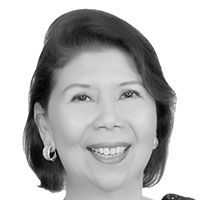Preventive suspension

Maybe it’s just me and my imagination, but there seems to be a creeping weaponization of a legal measure against opponents of those in power.
I’m referring to the preventive suspension of elective officials, for 60 days up to six months. Unlike punitive suspension, preventive or precautionary suspension need not wait for guilt to be established, and can be imposed ASAP, ostensibly to prevent the official being suspended from interfering with an ongoing administrative or criminal investigation.
Presuming regularity, the official reason for a preventive suspension makes sense. Of course anyone who commits wrongdoing – especially one who occupies the top or one of the key positions in the agency – will want to conceal evidence, influence potential witnesses and try to interfere in an ongoing probe.
Considering the state of Philippine politics and the situation in government agencies, however, you can see the strong potential for abuse of preventive suspensions, especially when elections are approaching.
The emerging new opposition is seeing the hand of the administration in the preventive suspension of two prominent local executives over what their camps deem to be flimsy excuses.
Davao del Norte Gov. Edwin Jubahib is under 60-day suspension, while Cebu City Mayor Michael Rama is preventively suspended for six months. The two have one thing in common: they approved the use of sites in their jurisdiction for “prayer rallies” during which former president Rodrigo Duterte, his sons and allies ranted against President Marcos.
Last April 10, Jubahib was preventively suspended by the Office of the President (OP) based on a complaint filed against him by a provincial board member for grave abuse of authority and oppression in connection with the use of a vehicle. This was after the approval of a Duterte rally in Tagum, which pushed through on April 14.
* * *
The Tagum rally must have particularly rankled Malacañang. It was where Davao del Norte First District Rep. Pantaleon Alvarez called on the military to withdraw support for President Marcos.
Alvarez later issued a public apology, received a slap on the wrist from the House of Representatives, and so far has not faced a criminal case for sedition. Jubahib got suspended, and could remain preventively suspended until the midterm elections.
Before the 60-day suspension lapsed, the OP reportedly slapped Jubahib last Friday with another 30-day suspension. This time, it’s over his participation in a motorcade rally supporting a House bill that seeks to expand the franchise area of Davao Light and Power Co. and replacing the Northern Davao Electric Cooperative, whose service Jubahib finds inadequate.
Preventive suspensions can be ordered by the OP, the Office of the Ombudsman, and now, as we are learning, even by the provincial governor.
Last week, Mayor Brigido Camarillo of Sta. Maria, Ilocos Sur was ordered preventively suspended for 60 days effective June 1 by Gov. Jeremias Singson upon the recommendation of the provincial board.
The municipal council had filed a complaint against Camarillo on Jan. 26 this year for allegedly failing to take action against an erring town treasurer, tolerating absentee employees and refusing to take action on other municipal issues. He was accused of unjustified absence from office and failing to convene meetings as mandated by law.
Camarillo was accused of gross negligence and dereliction of duty. The vice mayor is acting as mayor while the senior municipal councilor is the OIC vice mayor.
I’m not familiar with Ilocos Sur local politics, although I’m aware that the Singson dynasty is deeply entrenched at all levels of the local government. Let’s hope the moves against Camarillo are truly in pursuit of good governance instead of an underhanded way for his rivals to take over his post, undermining the mandate of the electorate who voted for him in 2022.
* * *
Late last week, former Duterte spokesman Harry Roque said the suspension of the former president’s younger son Sebastian as mayor of Davao City is expected.
The Department of the Interior and Local Government, which enforces suspension orders on local executives, dismissed the story as “pure rumor.”
During the “prayer rallies” with his father, congressman-brother Paolo and followers of fugitive pastor Apollo Quiboloy, Mayor “Baste” had competed with his father in the virulence of criticism of President Marcos.
Last week, however, the mayor extended an olive branch, saying he wanted peace with Marcos 2.0. Did Baste also hear the rumors about his possible suspension?
Considering the reasons cited in recent preventive suspension orders, those with the power to suspend can use practically any excuse to effectively kick out an elected official.
This can undermine the voters’ will and seriously disrupt governance.
Many local government executives face all sorts of administrative and even criminal complaints throughout their three-year term; it’s an occupational hazard in this country.
The complaints can be frivolous. Considering the pervasiveness of corruption and incompetence in government, however, many complaints are also valid.
If the provisions of Republic Act 6713, the Code of Conduct and Ethical Standards for Public Officials and Employees, would be strictly applied, the ranks of government officials and lower ranking personnel could be decimated. RA 3019, the Anti-Graft and Corrupt Practices Act, carries heavier penalties for related offenses.
Obviously, we don’t have enough jails for all of the crooks, their coddlers in the judiciary and accomplices in the private sector.
Currently, the most high-profile preventive suspension of a local executive involves the mayor of Bamban, Tarlac, Alice Guo, and two key municipal officials, in connection with the raid on a Philippine offshore gaming operator firm in a huge compound that she (used to, she says) co-owned.
Guo didn’t draw attention because of political rivalries, but because she is suspected to be a Chinese “sleeper” spy.
We’re still waiting for the denouement in the curious case of Alice Guo. As for the other suspended officials, however, what happens to governance when the top officials are replaced for up to six months, usually by persons belonging to a rival camp?
Before preventive suspension spreads and becomes a vile habit, like the unconstitutional suspension of the barangay and Sangguniang Kabataan elections to extend the terms of BSK officials, we should start applying the brakes.
- Latest
- Trending





























